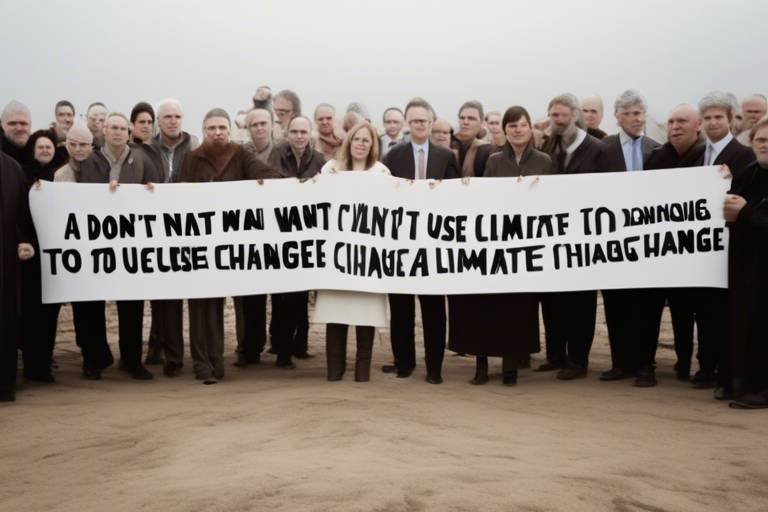A Philosophical Approach to Climate Change Politics
Climate change is not just an environmental issue; it’s a profound philosophical dilemma that challenges our understanding of ethics, responsibility, and human values. As we grapple with rising temperatures, extreme weather events, and the loss of biodiversity, we must ask ourselves: what does it mean to be responsible stewards of our planet? This article explores the intersection of philosophy and climate change politics, examining ethical considerations, policy implications, and the role of human values in addressing environmental challenges.
At its core, the dialogue surrounding climate change politics is steeped in ethical questions. Who bears the burden of climate action? Is it the individuals, the corporations, or the governments? The answers to these questions are not merely academic; they shape the policies that govern our lives and the planet’s future. By integrating philosophical frameworks into our discussions about climate change, we can better understand the moral responsibilities that come with our actions—or inactions. This approach allows us to view climate change not just as a scientific or economic issue, but as a fundamental challenge to our ethical beliefs and values.
As we delve deeper into this complex topic, we will explore various philosophical theories that provide unique perspectives on climate policy. For instance, utilitarianism encourages us to consider the greatest good for the greatest number, while deontological ethics emphasizes our inherent duties towards the environment and future generations. By examining these frameworks, we can uncover insights that may guide more effective and just climate policies.
Moreover, the role of human values cannot be overstated. Values shape our perceptions, influence our decisions, and ultimately drive our actions. Understanding the cultural, social, and personal values that motivate individuals and communities is crucial for fostering collective action against climate change. As we navigate this philosophical landscape, we will highlight the importance of education and awareness in cultivating a sense of personal responsibility towards environmental stewardship.
In conclusion, a philosophical approach to climate change politics invites us to reflect on our ethical obligations and the values that guide our actions. As we face one of the most pressing challenges of our time, embracing this perspective can empower us to create meaningful change. Together, we can forge a path towards a sustainable future that respects both our planet and the diverse communities that inhabit it.
- What is the main ethical concern regarding climate change? The primary ethical concern is the distribution of responsibilities and burdens among individuals, corporations, and governments in addressing climate change.
- How do philosophical theories influence climate policy? Philosophical theories, like utilitarianism and deontology, provide frameworks for evaluating the moral implications of climate policies and help in balancing economic and environmental considerations.
- Why are values important in climate action? Values shape our attitudes and behaviors towards the environment, influencing public engagement and support for climate policies.
- Can individual actions make a difference in combating climate change? Yes, individual actions can collectively lead to significant change, especially when supported by education and awareness initiatives.

The Ethical Dimensions of Climate Change
When it comes to climate change, we find ourselves at a crucial crossroads that demands not just scientific understanding but also a deep dive into the ethical dimensions of our actions. It's not just about the environment; it's about the moral responsibilities we carry as individuals and as a society. Have you ever stopped to think about what our obligations are to future generations? Or how our choices today might impact those who come after us? These questions are at the heart of the ethical debate surrounding climate change.
At its core, the ethical conversation around climate change revolves around the concept of intergenerational justice. This idea posits that we owe a duty to future generations to leave them a planet that is not only habitable but thriving. Imagine inheriting a house that is in disrepair; wouldn’t you feel a sense of obligation to fix it up before passing it on? Similarly, our planet requires care and attention to ensure that it remains a safe haven for those who will inhabit it in the years to come.
Moreover, we must consider the disparities in responsibility. Developed nations, which have historically contributed the most to greenhouse gas emissions, bear a significant moral burden. On the other hand, developing countries often suffer the most from the impacts of climate change, despite contributing the least to the problem. This raises important questions: Should wealthier nations provide support to those most affected? How can we ensure that our climate policies are equitable and just?
To navigate these ethical waters, we need frameworks that guide our decision-making processes. Ethical theories can serve as valuable tools in this regard. For instance, a utilitarian approach would advocate for actions that maximize overall happiness and reduce suffering, while a deontological perspective might emphasize our inherent duties to protect the environment and respect the rights of all living beings.
Ultimately, addressing climate change is not merely a technical challenge; it’s a moral imperative. As we formulate policies and take action, we must ask ourselves: are we acting in a way that reflects our values? Are we prioritizing the well-being of our planet and its inhabitants? By embedding ethical considerations into our climate strategies, we can create a more sustainable and just future.
In conclusion, the ethical dimensions of climate change compel us to reflect on our responsibilities, both to ourselves and to those who will come after us. It’s a call to action that transcends borders and generations, urging us to unite in the face of a common challenge. As we move forward, let’s ensure that our actions today resonate with the values we hold dear, paving the way for a brighter tomorrow.

Philosophical Theories and Climate Policy
When we think about climate policy, it's essential to realize that our decisions aren't just based on hard facts and figures; they are deeply rooted in philosophical theories that shape our understanding of right and wrong. Different philosophical frameworks offer unique lenses through which we can view the pressing issues of climate change. For instance, utilitarianism, which emphasizes the greatest good for the greatest number, pushes us to consider how policies can benefit the majority. Meanwhile, deontological ethics focuses on the inherent duties we have towards the environment, urging us to uphold our obligations to both present and future generations.
Utilitarianism, as a guiding principle, encourages policymakers to evaluate the outcomes of climate actions based on their ability to maximize overall happiness. This approach often leads to discussions about balancing economic growth with environmental sustainability. Imagine a scenario where a new renewable energy project not only reduces carbon emissions but also creates jobs and boosts local economies. In this case, utilitarianism would support the project, as it aligns with the principle of promoting collective well-being.
However, there are challenges associated with utilitarian approaches. One significant concern is the potential neglect of minority rights. In striving to achieve the greatest good, the needs of smaller communities or marginalized groups may be overlooked. For example, if a large-scale solar farm is built on land traditionally used by indigenous peoples, the immediate economic benefits may overshadow the cultural and social costs. Thus, while utilitarianism provides a useful framework, it’s crucial to ensure that policies do not sacrifice the rights and well-being of the few for the benefit of the many.
On the other hand, deontological ethics asserts that we have moral duties that transcend the consequences of our actions. This perspective emphasizes our obligations to protect the environment, not just for our benefit but for the sake of future generations and non-human entities. For instance, we might feel a moral responsibility to preserve biodiversity, recognizing that every species plays a role in the ecosystem. This duty-based approach can lead to stricter regulations and policies that prioritize environmental protection, even if they come with economic trade-offs.
To illustrate these philosophical theories in action, let’s consider a few case studies:
| Case Study | Philosophical Approach | Outcome |
|---|---|---|
| Renewable Energy Investment | Utilitarianism | Job creation and reduced emissions |
| Protected Species Legislation | Deontological Ethics | Stricter protections for endangered species |
| Carbon Tax Implementation | Utilitarianism | Reduced carbon footprint, but economic pushback |
| Climate Justice Initiatives | Deontological Ethics | Empowerment of marginalized communities |
In conclusion, the intersection of philosophical theories and climate policy is complex and multifaceted. By understanding these frameworks, we can better navigate the ethical landscape of climate action. It’s not just about what we do; it’s about why we do it. As we move forward, it’s crucial to integrate these philosophical insights into our policy-making processes to ensure that we are not only effective but also just in our approach to tackling climate change.
- What is utilitarianism? Utilitarianism is a philosophical theory that suggests actions are right if they promote the greatest happiness for the greatest number.
- How does deontological ethics apply to climate change? Deontological ethics emphasizes moral duties and obligations, suggesting that we have a responsibility to protect the environment for future generations.
- Why are philosophical theories important in climate policy? They provide frameworks for understanding the ethical implications of our decisions and help guide policymakers in creating fair and effective solutions.

Utilitarianism in Climate Decision-Making
Utilitarianism, a philosophical theory that advocates for actions that promote the greatest happiness for the greatest number, offers a compelling framework for tackling the pressing issue of climate change. Imagine standing at a crossroads where every decision impacts not just your life but the lives of countless others; this is the reality policymakers face today. The essence of utilitarianism lies in its focus on outcomes, compelling us to consider how our choices affect the broader community and the environment. In the context of climate change, this means prioritizing policies that yield the most significant overall benefits, addressing not only current challenges but also the long-term sustainability of our planet.
One of the fundamental questions that arise in utilitarian decision-making is: how do we measure happiness and well-being in relation to environmental policies? This is where things get tricky. For instance, a policy that benefits the majority might inadvertently harm a minority group. Consider the case of a large-scale renewable energy project that displaces a small community. While the project might significantly reduce carbon emissions and provide energy to thousands, the displaced residents face loss of homes and livelihoods. Here, utilitarianism urges us to weigh the overall benefits against the detriments to a smaller group, fostering a more nuanced discussion about what constitutes the "greater good."
Furthermore, the application of utilitarian principles in climate policy can lead to innovative solutions that balance economic growth with environmental protection. For example, governments might consider investing in green technologies that not only reduce emissions but also create jobs, thereby maximizing both ecological and economic happiness. A cost-benefit analysis can be instrumental in this process, allowing policymakers to visualize potential outcomes and make informed decisions. Below is a simplified table illustrating how different climate policies can be evaluated through a utilitarian lens:
| Policy | Potential Benefits | Potential Drawbacks | Overall Impact |
|---|---|---|---|
| Renewable Energy Investment | Job creation, reduced emissions | Displacement of communities | High |
| Carbon Tax Implementation | Incentivizes emission reduction | Increased cost of living | Moderate to High |
| Reforestation Programs | Carbon sequestration, biodiversity | Initial costs, land use conflicts | High |
Utilitarianism also encourages public engagement in climate decision-making. By involving communities in discussions about the potential impacts of various policies, we can better understand the collective values and concerns that shape public happiness. This participatory approach not only enriches the decision-making process but also fosters a sense of ownership among citizens, making them more likely to support and adhere to the resulting policies. After all, when people feel their voices are heard, they are more inclined to contribute positively to climate action.
However, it's essential to recognize the limitations of utilitarianism in climate policy. While it provides a clear framework for assessing the consequences of actions, it can sometimes oversimplify complex ethical dilemmas. The challenge remains: how do we ensure that the pursuit of the greatest happiness does not come at the expense of vulnerable populations or future generations? This is where the integration of other ethical theories, such as deontology, can offer a more holistic approach to climate decision-making.
In conclusion, utilitarianism serves as a valuable tool in the climate change discourse, prompting us to consider the broader implications of our decisions. By focusing on the greatest good for the greatest number, we can navigate the complexities of climate policy while striving for a sustainable future. The journey towards effective climate action is undoubtedly fraught with challenges, but with a utilitarian lens, we can illuminate the path forward, ensuring that our choices today lead to a brighter tomorrow for all.

Challenges of Utilitarian Approaches
Utilitarianism, while a compelling framework for addressing climate change, is not without its challenges. One of the most significant issues is the potential neglect of minority rights. Imagine a community that relies on fishing for its livelihood. If the majority of society decides that transitioning to renewable energy sources is the best course of action, the voices of those fishermen might be drowned out. Their immediate economic needs could be overlooked in favor of a broader goal that benefits the majority. This raises a critical question: how do we ensure that the rights and needs of minorities are considered in a utilitarian calculus?
Another challenge is the difficulty in quantifying happiness and well-being in environmental contexts. In theory, utilitarianism seeks to maximize overall happiness, but how do we measure happiness when it comes to the environment? Is it the number of trees planted, the amount of carbon reduced, or the health of a community? The subjective nature of happiness can lead to varying interpretations, making it hard to create policies that genuinely reflect the greatest good.
Moreover, utilitarian approaches often prioritize short-term gains over long-term sustainability. For instance, a government might decide to exploit fossil fuel reserves because it promises immediate economic benefits, ignoring the long-term consequences of climate change. This shortsightedness can be likened to a person who spends all their savings on a lavish vacation, only to find themselves broke when an emergency arises. The allure of immediate satisfaction can cloud judgment, leading to decisions that jeopardize future generations.
To illustrate these challenges, consider the following table that outlines some of the key criticisms of utilitarian approaches in climate policy:
| Challenge | Description |
|---|---|
| Neglect of Minority Rights | Utilitarianism may overlook the needs and rights of minority groups in favor of majority benefits. |
| Quantifying Happiness | Measuring happiness in environmental contexts is subjective and complex, leading to varied interpretations. |
| Short-Term vs Long-Term | Focus on immediate benefits can result in decisions that are detrimental to future generations. |
As we navigate the complexities of climate change politics, it’s essential to recognize these challenges. Addressing them requires a more nuanced approach that considers not only the majority's happiness but also the rights and well-being of all individuals involved. Engaging in open dialogues and incorporating diverse perspectives can help create policies that are not only effective but also fair.
- What is utilitarianism? Utilitarianism is a philosophical theory that suggests actions are right if they promote the greatest happiness for the greatest number.
- Why is minority rights a concern in utilitarian approaches? Because utilitarianism focuses on the majority, there is a risk that the needs and rights of minority groups may be ignored.
- How can we measure happiness in climate policy? Measuring happiness in environmental contexts can involve various metrics, including community health, economic stability, and ecological sustainability.
- What are some alternatives to utilitarianism in climate policy? Alternatives include deontological ethics, which emphasizes duties and rights, and virtue ethics, which focuses on moral character.

Case Studies in Utilitarian Policy
When we think about utilitarianism in the context of climate change policy, it's essential to explore real-world examples that illustrate how this philosophical approach has been applied. One notable case is the implementation of carbon pricing mechanisms, such as carbon taxes and cap-and-trade systems. These policies aim to reduce greenhouse gas emissions by putting a price on carbon, thereby incentivizing businesses and individuals to lower their carbon footprints. The underlying idea is straightforward: by maximizing overall societal welfare through reduced emissions, we can create a healthier environment for the majority.
For instance, Sweden's carbon tax, introduced in 1991, serves as a prime example of utilitarianism in action. The tax has successfully reduced emissions while simultaneously promoting economic growth. By taxing carbon emissions, the government encourages businesses to innovate and adopt cleaner technologies, ultimately benefiting society at large. The success of this policy has led to a significant decrease in emissions—over 25% since its implementation—while the economy has continued to grow. This scenario illustrates how utilitarian principles can guide effective climate policy that seeks to maximize the well-being of both current and future generations.
However, not all utilitarian approaches have been as successful or straightforward. The case of the Kyoto Protocol, an international agreement aimed at reducing greenhouse gas emissions, highlights some complexities. While the protocol aimed to create a collective benefit for all participating countries, it faced criticism for allowing developed nations to maintain higher emission levels while imposing stricter limits on developing nations. This disparity raises ethical questions about the fairness of such policies and whether they truly serve the greater good. The utilitarian approach can sometimes overlook the needs and rights of minority groups, particularly those in vulnerable positions who may bear the brunt of climate change impacts.
To further understand the effectiveness and limitations of utilitarian policies, let's consider a comparison table that outlines some key case studies:
| Case Study | Utilitarian Principle Applied | Outcomes |
|---|---|---|
| Sweden's Carbon Tax | Maximizing societal welfare through reduced emissions | 25% reduction in emissions; economic growth continued |
| Kyoto Protocol | Collective benefit for participating nations | Criticism for inequality; developed vs. developing nations |
| California Cap-and-Trade Program | Market-based approach to reduce emissions | Successful emission reductions; economic incentives for green technology |
In summary, while utilitarianism offers a valuable framework for addressing climate change, it is not without its challenges. The balance between maximizing overall happiness and ensuring equitable treatment for all stakeholders remains a critical consideration in the formulation of effective climate policies. By examining these case studies, we can glean insights into how utilitarian principles can be harnessed to create impactful environmental strategies while acknowledging the complexities inherent in such approaches.
Q: What is utilitarianism in the context of climate change?
A: Utilitarianism is a philosophical approach that advocates for actions that maximize overall happiness and well-being. In climate change, it emphasizes policies that benefit the greatest number of people while reducing environmental harm.
Q: Can you give an example of a successful utilitarian climate policy?
A: Yes, Sweden's carbon tax is a prime example. It has effectively reduced emissions while promoting economic growth, demonstrating how utilitarian principles can guide successful environmental policies.
Q: What are the challenges of applying utilitarianism to climate policy?
A: Challenges include the potential neglect of minority rights and the difficulty of quantifying happiness and well-being in environmental contexts, which can complicate decision-making processes.

Deontological Ethics and Environmental Duties
When we think about our responsibilities towards the environment, deontological ethics offers a compelling framework. Unlike utilitarianism, which focuses on the outcomes of actions, deontology emphasizes the inherent duties and rights we have. Imagine if every action we took was guided by a moral compass that prioritized our obligations to the planet and its inhabitants. This perspective encourages us to consider not just the consequences of our actions, but also the principles behind them.
At the heart of deontological ethics is the idea that we have a duty to protect the environment, not just for our benefit, but as a moral obligation to future generations and non-human entities. This means that we should treat the natural world with respect, acknowledging that every creature has a right to exist and thrive. For instance, many argue that we have a duty to preserve biodiversity because each species plays a unique role in our ecosystem, and their extinction can have unforeseen consequences. In this sense, environmental duties can be seen as universal moral laws that transcend individual interests.
Furthermore, deontological ethics prompts us to consider the rights of future generations. What kind of world are we leaving behind? This ethical consideration is crucial as it raises questions about sustainability and long-term consequences of our actions. For example, the decision to exploit natural resources for short-term gain can be viewed as a violation of our duty to ensure that future generations inherit a livable planet. We must ask ourselves: Are we acting as stewards of the Earth, or are we merely consumers, depleting what we have without thought for the future?
In practical terms, deontological ethics can guide policies and individual actions aimed at environmental protection. For instance, laws that safeguard endangered species or regulate pollution can be seen as expressions of our moral duty to the planet. However, translating these ethical principles into actionable policies can be challenging. It requires a societal consensus on what our duties are and how we prioritize them. This is where public engagement and education come into play, helping to foster a collective understanding of our responsibilities.
Ultimately, adopting a deontological approach to environmental duties encourages a profound shift in how we view our relationship with nature. It challenges us to think beyond immediate benefits and consider the moral implications of our actions. By recognizing that we have ethical obligations to the environment, we can cultivate a more sustainable and just world for all living beings.
- What is deontological ethics? Deontological ethics is a moral philosophy that focuses on the inherent duties and rights individuals have, rather than the consequences of their actions.
- How does deontological ethics apply to climate change? It emphasizes our moral obligations to protect the environment and consider the rights of future generations and non-human entities.
- Can deontological ethics influence environmental policy? Yes, it can guide the creation of laws and regulations that prioritize environmental protection based on moral duties.
- What are some examples of deontological duties towards the environment? Duties may include preserving biodiversity, reducing pollution, and ensuring sustainable resource use for future generations.

The Role of Values in Climate Action
Understanding the values that drive climate action is crucial for fostering collective efforts in tackling the pressing issue of climate change. Values are not just abstract concepts; they shape our beliefs, influence our behaviors, and ultimately determine how we engage with the world around us. When it comes to climate action, these values can vary widely among different cultures, communities, and individuals. For instance, some people may prioritize economic growth over environmental sustainability, while others may see the protection of nature as a fundamental right. This divergence in values can lead to varying degrees of public engagement and policy support.
To illustrate, consider how cultural values play a significant role in shaping attitudes towards climate change. In many indigenous cultures, there is a deep-rooted belief in the interconnectedness of all living things. This perspective fosters a sense of stewardship towards the environment, encouraging communities to engage in sustainable practices. Conversely, in more industrialized societies, where consumerism often reigns supreme, environmental concerns may take a backseat to economic interests. As such, the challenge lies in bridging these gaps and fostering a shared sense of responsibility towards our planet.
Moreover, personal responsibility is another critical aspect of climate action. Each individual’s values can motivate them to take action, whether through reducing their carbon footprint, advocating for policy changes, or supporting sustainable businesses. Education and awareness play pivotal roles here; when people understand the impact of their choices, they are more likely to align their actions with their values. For example, many individuals are now opting for renewable energy sources or adopting plant-based diets, driven by a desire to contribute positively to the environment. This shift towards personal accountability can create a ripple effect, inspiring others to follow suit.
In conclusion, the role of values in climate action cannot be overstated. They serve as the foundation upon which we build our responses to environmental challenges. By fostering a culture that emphasizes sustainability and collective responsibility, we can create a more unified approach to combatting climate change. This means engaging in dialogues that explore and respect diverse values while encouraging a shared commitment to protecting our planet for future generations.
- What are the key values that influence climate action? Values such as sustainability, stewardship, and social responsibility are pivotal in shaping attitudes and behaviors towards climate action.
- How can cultural beliefs impact climate change initiatives? Cultural beliefs can either promote or hinder environmental efforts, as they shape how communities prioritize sustainability and engage with climate issues.
- What role does education play in fostering personal responsibility for climate action? Education raises awareness about environmental issues and empowers individuals to make informed decisions that align with their values.

Cultural Influences on Environmental Values
Cultural beliefs and practices are like the invisible threads that weave together our perceptions of the world around us, including how we view climate change and environmental responsibility. These threads are not just decorative; they shape our attitudes, priorities, and actions regarding the environment. For instance, in cultures where nature is revered as sacred, there's often a deep-seated respect for ecological balance. This respect translates into a strong commitment to sustainability and conservation efforts. On the other hand, in cultures that prioritize economic growth above all else, environmental issues may take a backseat, leading to policies that favor short-term gains over long-term ecological health.
It's fascinating to observe how different cultural backgrounds can influence environmental values. For example, Indigenous cultures often have a holistic view of nature, seeing themselves as part of a larger ecosystem rather than separate from it. This perspective fosters a sense of stewardship, where caring for the land is not just an obligation but a way of life. In contrast, more industrialized societies may adopt a more utilitarian approach, viewing nature primarily as a resource to be exploited for economic benefit. This dichotomy raises important questions: How can we bridge these cultural gaps? What can we learn from one another to foster a more unified approach to climate action?
Additionally, the role of education cannot be overstated. In many cultures, the transmission of environmental values occurs through storytelling, rituals, and community practices. These methods can be incredibly powerful in shaping how future generations perceive their relationship with the environment. For instance, children raised in communities that emphasize sustainability are more likely to carry those values into adulthood. Conversely, in societies where environmental education is lacking, individuals may struggle to understand the importance of their actions in the larger context of climate change.
To illustrate this point further, consider the following table that contrasts various cultural approaches to environmental values:
| Cultural Context | Environmental Values | Impact on Climate Action |
|---|---|---|
| Indigenous Cultures | Holistic stewardship, reverence for nature | Strong community-led conservation efforts |
| Industrialized Societies | Utilitarianism, economic growth focus | Policies favoring short-term economic benefits |
| Collectivist Cultures | Community responsibility, shared values | Collaborative climate initiatives |
| Individualistic Cultures | Personal responsibility, innovation | Emphasis on technological solutions |
In summary, understanding the cultural influences on environmental values is crucial for developing effective climate policies. By recognizing and respecting these diverse perspectives, we can foster a more inclusive dialogue that encourages collective action. Whether through community engagement, educational initiatives, or policy reforms, the goal should be to create a shared vision that transcends cultural boundaries and unites us in the fight against climate change.
- How do cultural values impact climate change policies? Cultural values shape how communities prioritize environmental issues, influencing policy development and public engagement.
- What role does education play in fostering environmental values? Education helps instill a sense of responsibility and awareness about environmental issues, shaping future generations' attitudes and actions.
- Can different cultures collaborate on climate action? Yes, by recognizing and respecting diverse cultural perspectives, communities can work together to create effective climate strategies that benefit everyone.

Personal Responsibility and Climate Action
When it comes to tackling climate change, the concept of personal responsibility emerges as a powerful catalyst for action. It's easy to feel overwhelmed by the enormity of the climate crisis, but understanding that individual choices can contribute to a larger movement is crucial. Just as a single drop can create ripples in a pond, each person's actions can lead to significant environmental change. But what does this really mean for you and me?
First off, let's consider the choices we make in our daily lives. From the food we eat to the energy we consume, our decisions can either contribute to the problem or help mitigate it. For instance, opting for a plant-based diet can reduce your carbon footprint significantly. According to a study by the World Resources Institute, if everyone in the U.S. substituted beans and nuts for beef and cheese just one day a week, it would be like taking 7.6 million cars off the road. Imagine the impact if more people made similar changes!
Moreover, our consumption patterns play a pivotal role in climate action. The more we buy, the more resources are extracted, often leading to environmental degradation. By embracing a mindset of minimalism or conscious consumerism, we can reduce waste and lower our environmental impact. This means asking ourselves crucial questions: Do I really need this? Is this product sustainable? Such reflections can guide us towards more responsible purchasing decisions.
Education is another vital aspect of personal responsibility. The more we understand about climate change and its effects, the better equipped we are to make informed decisions. Engaging with educational resources—be it books, documentaries, or community workshops—can empower us to take action. For example, many local organizations offer workshops on sustainable living practices, from composting to energy conservation. By participating in these initiatives, we not only learn but also inspire others to follow suit.
Additionally, our voices matter. Advocacy is an essential component of climate action, and it starts with each of us. Writing to local representatives, participating in community meetings, or even sharing information on social media can amplify the message of climate urgency. When we speak up, we encourage others to join the conversation and push for policies that prioritize sustainability. Collective action can lead to significant changes, especially when fueled by a community of engaged individuals.
To wrap it up, personal responsibility in climate action is not just about individual choices; it’s about fostering a culture of awareness, education, and advocacy. When we embrace our role as stewards of the planet, we can create a ripple effect that inspires others to take action. So, what will you do today to contribute to a healthier planet? Remember, every small step counts!
- What are some simple actions I can take to reduce my carbon footprint?
Some simple actions include using public transport, reducing meat consumption, conserving energy at home, and recycling.
- How can I educate myself about climate change?
You can read books, watch documentaries, attend workshops, and follow reputable online resources dedicated to climate education.
- What role does advocacy play in climate action?
Advocacy raises awareness, influences policy decisions, and mobilizes community efforts towards sustainable practices.
Frequently Asked Questions
- What ethical responsibilities do individuals have in combating climate change?
Individuals have a moral obligation to reduce their carbon footprint and advocate for sustainable practices. This includes making conscious choices like reducing waste, using public transport, and supporting eco-friendly policies. By taking small steps, we contribute to a larger collective effort to combat climate change.
- How do philosophical theories influence climate policy?
Philosophical theories, such as utilitarianism and deontology, provide frameworks for understanding the implications of climate policies. Utilitarianism focuses on maximizing overall happiness, while deontology emphasizes our duties towards the environment and future generations. These perspectives shape how policies are formulated and implemented.
- What are the challenges of applying utilitarianism to climate decision-making?
While utilitarianism aims to benefit the majority, it can overlook the rights of minority groups and the complexities of measuring happiness in environmental contexts. This can lead to policies that favor short-term gains over long-term sustainability, potentially harming vulnerable populations.
- Can you provide examples of utilitarian principles in climate policy?
Yes! Case studies such as carbon trading systems and renewable energy incentives illustrate how utilitarian principles can guide climate policy. These initiatives aim to create the greatest good by reducing emissions and promoting sustainable energy sources, benefiting both current and future generations.
- What role do cultural values play in shaping environmental attitudes?
Cultural beliefs and practices significantly influence how communities perceive and prioritize climate issues. For instance, cultures that emphasize collective well-being may engage more actively in sustainability efforts compared to those that prioritize individualism. Understanding these cultural nuances is essential for effective climate action.
- How can personal responsibility drive climate action?
Personal responsibility is crucial for fostering a culture of sustainability. When individuals recognize their impact on the environment, they are more likely to engage in eco-friendly behaviors, such as recycling and conserving energy. Education and awareness are key to motivating these changes and promoting a sense of shared responsibility.



















